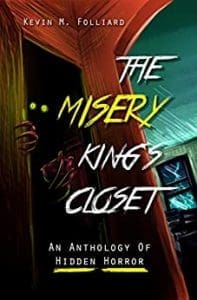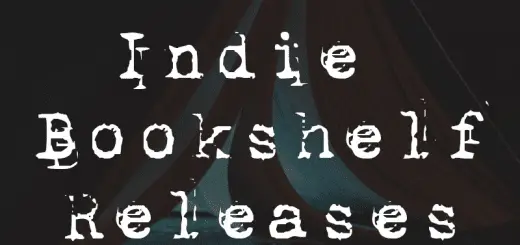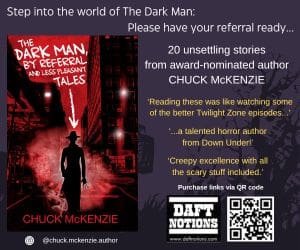Horror Tree presents … An interview with Kevin M. Folliard

 Kevin M. Folliard’s latest release is an anthology of hidden horror titled The Misery King’s Closet. Released September 3rd, the collection features short stories that “share threads of dark secrets, hidden shame, and lurking monsters” with “characters haunted by addictions, parasites, dark truths, and heinous choices.”
Kevin M. Folliard’s latest release is an anthology of hidden horror titled The Misery King’s Closet. Released September 3rd, the collection features short stories that “share threads of dark secrets, hidden shame, and lurking monsters” with “characters haunted by addictions, parasites, dark truths, and heinous choices.”
The Illinois author explains in the book’s Foreword that the tales in The Misery King’s Closet “taught me a great deal about myself.”
“I think any fiction writer is grappling with truth about the world around us, and filtering those observed truths through storytelling,” Folliard told The Horror Tree in an exclusive interview. “There are little pieces of your own life, struggles, and experiences which materialize in your fiction. It was rewarding to step back, look at a body of work spanning the better part of a decade, and see how the themes manifested and repeated. I’ve come to notice how a lot of my characters deal with addictions, unhealthy relationships or behaviors, identity, nature versus nurture, and grief. These are all issues that have surfaced in my life in some way shape or form.
“In putting together this collection, I tried to group the stories together so that we had an ebb and flow of similar, but related themes of dark secrets and monsters, both internal and external. Writing helps me to better understand the issues that preoccupy and fascinate me about the human condition, and better yet, when you know and recognize those themes, it helps you lean into them, challenge them, and explore them —hopefully — in eloquent and interesting ways. I guess that’s a fancy way of saying that maybe I learned that I’m mostly scared of my own flawed humanity, as well as the idea that so many bad forces in life are hidden in plain sight.”
Like many modern horror writers, Folliard is influenced by Stephen King.
“I’m always happy to get the compliment when someone compares something I wrote to King,” said Folliard, who earned a degree in English and Creative Writing from the University of Illinois at Urbana-Champaign. “I also love Michael Crichton, Arthur Conan Doyle, J.R.R. Tolkien, C.S. Lewis, Edgar Allen Poe, Ray Bradbury, and more. It’s fun when I can look back and tell who I was emulating, and I’m not always aware of it in the moment. For example, my book Jake Carter & the Nightmare Gallery now feels very much like my version of Bradbury’s Something Wicked This Way Comes, but I had no idea while I was writing it.
“In this collection, the story ‘Midnight Man’ was partially inspired by an interview I saw about how Wes Craven had seen a scary stranger from his window as a child, which may have been the template for Freddy Krueger. One of my favorite movies is Silence of the Lambs, and Hannibal Lecter has always stuck with me with his dark charisma. The Misery King and a lot of my other monstrous characters are like that — an evil force that has a magnetic power to draw you in.”
 Folliard’s collection is chiefly filled with previously published stories, but it opens with the original tale “The Misery King’s Closet,” a perfect introduction for a collection of hidden horror.
Folliard’s collection is chiefly filled with previously published stories, but it opens with the original tale “The Misery King’s Closet,” a perfect introduction for a collection of hidden horror.
“The story ‘The Misery King’s Closet’ was written specially for this collection, though I wanted it to work as its own piece of flash fiction as well,” Folliard said. “Since I had my theme of hidden horror, I knew I needed a thematic opening salvo to unite the anthology. I also loved the idea of having a Rod Serling-style Twilight Zone introduction. I struggled to come up with a good title for the collection, and it helped to tie the title into a character who could be a kind of ‘King of Monsters’ for all the spooky stuff I’ve been writing about. Hopefully, I’ll get to do another collection, and I can bring the Misery King back for another kickoff.”
A highlight of the collection is the story “Mirror Mirror,” which deals with childhood fear.
“Childhood fears definitely interest me, and I’m fascinated by stories where they can be real,” Folliard said. “My personal fears have probably changed a lot since I was a child, but there’s a primal flavor of fear when you’re young. I guess it’s because the unknown is so much scarier and more infinite than it is when we grow up. We ultimately learn that there are no monsters under the bed or in the closet, and we start to fear more practical things.
“When I was a kid, I shared a room with my older brother, and I always wanted to sleep with the closet light on. He wanted to sleep with it off, in total darkness. So, he told me: ‘If you sleep with the light off, ghosts come. But if you sleep with the closet light on, aliens come.’ So, I learned at a very young age that you’re damned if you do and damned if you don’t, and he got to have his way.”
One of the more powerful stories is “Halfway to Forgotten,” a suspenseful allegory of addiction.
“I find horror is a great medium for exploring real, important, and uncomfortable issues,” Folliard said. “I’ve written a number of stories where on the first draft that ‘real problem’ was under the surface, and the best advice I got was to always bring it out more. There’s a fine line between being preachy and being insightful sometimes, but what matters most is that stories are honest. I don’t want to try to resolve complex issues or problems for my characters artificially, but I think the story is always stronger when the reader can sincerely experience that character’s situation.”
Folliard dedicated The Misery King’s Closet to the La Grange and Brookfield Writers Groups.
“These two local writers’ groups have been essential in helping me to hone my fiction writing,” Folliard said. “I started attending the La Grange Writers Group in my community about ten years ago, and I met a number of talented, published writers who have helped me to strengthen my prose and bring out the thematic value of my stories. Over the years, I was introduced to our sister group in Brookfield, and I’ve had the privilege of working with and learning from a diverse group of writers who have come and gone. I’ve gained from their honest feedback, advice, and comradery. I think writing can often be a lonely art, and I would encourage anyone to find a local group to share the process. You learn a lot by having people respond to your writing, and you learn just as much, maybe more, from critiquing other people’s writing.”
Folliard’s list of other works include genre fiction for young adults and holiday horror collections.
“When I was in my 20s, I really wanted to be a middle-grade/YA author,” Folliard said. “I wanted to write the kinds of books that I loved growing up, books that didn’t talk down to young readers, but instead challenged them, scared them, and inspired them. I found out that big publishers weren’t all that interested in my books for younger readers, but along the way, I learned that I had a knack for getting adult horror out there in the publishing world. I started focusing more on that, and really enjoying it. I’ve shifted much more from writing for a younger audience toward writing for an older audience, but I honestly love both. And as I’m writing this, I may have a deal in the works for a middle-grade adventure book, so hopefully I can keep doing both.”
In 2019, Demain Publishing added Folliard’s tale Candy Corn to its series of standalone releases titled Short Sharp Shocks!
“I was thrilled to get Candy Corn out there as its own Short Sharp Shocks single,” said Folliard. “It’s one of my favorite stories that I’ve written, and it can be challenging to find a home for novelette and novella length stories. I love how Demain has given so many talented writers a venue for novellas, and I’m happy to say I’ve got another Short Sharp Shock on the horizon. Big thanks to editor Dean Drinkel for taking a chance on my writing.”
The Misery King’s Closet features short stories, including drabbles, previously published in The Horror Tree’s ezine Trembling With Fear.
“I started writing drabbles for The Horror Tree who has been kind enough to publish a lot of my fiction, including many of the flash and drabbles in this collection,” Folliard said. “I found it to be a challenging way to convey a complete story in a tight package. I’m a big fan of flash fiction and short form entertainment in general. Placing constrictions on your word count can really help you to find interesting ideas. It’s also a good exercise for long-form writing, because it forces you to craft lean, strong prose. I love how the Internet age has allowed for flash fiction to flourish.”
Since The Horror Tree is a resource for writers, I asked Folliard if he could offer any advice.
“Be open to criticism,” Folliard said. “You can’t always please every reader, but you can learn from every reader. I think one of the major differences between published authors and unpublished authors might be ‘thick skin.’ You need to recognize and accept when something’s not working and sort it out. You need to take scores of rejections before you can celebrate that one acceptance. I’ve been writing fiction almost my entire life, and my progress has been so gradual that it’s easy not to notice.
“Writing takes time. It’s personal, but it needs to mean something to an audience, and that means listening to critiquers and editors. It means carefully fine-tuning stories until they are on just the right frequency where they connect you to an audience in a meaningful way. Fiction writers must be patient and committed.”
LINKS:
Website: https://www.kevinfolliard.com/
Amazon Author Page: https://www.amazon.com/Kevin-Folliard/e/B0097S7T0A/ref=dp_byline_cont_pop_ebooks_1
Twitter: @Kmfollia
- About the Author
- Latest Posts
Lionel Ray Green is a horror and fantasy writer, an award-winning newspaper journalist, and a U.S. Army gulf war veteran living in Alabama. His short stories have appeared in more than two dozen anthologies, magazines, and ezines, including The Best of Iron Faerie Publishing 2019; America’s Emerging Science Fiction and Fantasy Writers: Deep South; and Alabama’s Emerging Writers. Drop by https://lionelraygreen.com/ and say hello.











This writer is a genius! So in tune with his audience. Very fresh.